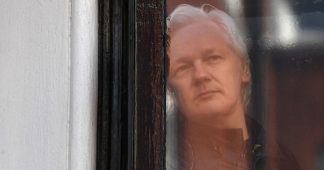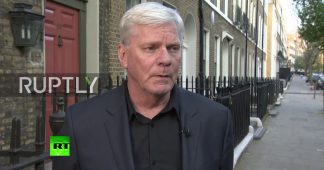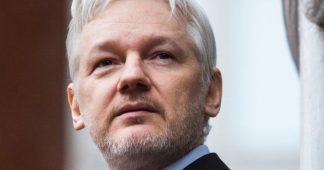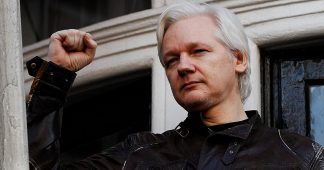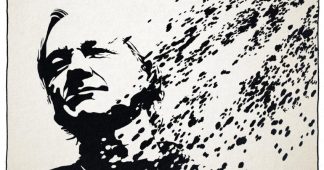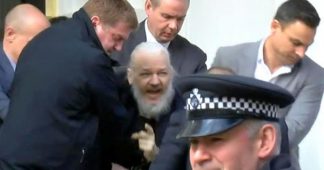Assange helped teach the people about our tarnished freedom – now we are all he has left to defend him
The panic and fury with which those in power – those who control our digital commons – reacted to Assange, is proof that such activity hits a nerve
It finally happened – Julian Assange was dragged from the Ecuadorian embassy and arrested. It was no surprise: many signs pointed in this direction.
A week or two ago, Wikileaks predicted the arrest, and the Ecuadorian foreign ministry responded with what we now know were lies. The recent rearrest of Chelsea Manning (largely ignored by the media) was also an element in this game. Her confinement, designed to force her to divulge information about links with Wikileaks, is part of the prosecution that awaits Assange when (if) the US gets hold of him.
There were also clues in the long, slow well-orchestrated campaign of character assassination which reached the lowest level imaginable a couple of months ago with unverified rumors that the Ecuadorians wanted to get rid of him because of his bad smell and dirty clothes.
In the first stage of attacks on Assange, his ex-friends and collaborators went public with claims that Wikileaks began well but then it got bogged down with Assange’s political bias (his anti-Hillary obsession, his suspicious ties with Russia…). This was followed by more direct personal defamations: he is paranoiac and arrogant, obsessed by power and control.
Assange a paranoiac? When you live permanently in an apartment which is bugged from above and below, victim of constant surveillance organised by secret services, who wouldn’t be that? Megalomaniac? When the (now ex-) head of the CIA says your arrest is his priority, does not this imply that you are a “big” threat to some, at least? Behaving like the head of a spy organisation? But Wikileaks IS a spy organisation, although one that serves the people, keeping them informed on what goes on behind the scenes.
So let’s move to the big question: why now? I think one name explains it all: Cambridge Analytica – a name which stands for all Assange is about, for what he fights against, and describes the link between great private corporations and government agencies.
Remember how big topic an obsession Russian meddling in the US elections became – now we know it was not Russian hackers (with Assange) who nudged the people towards Trump. Instead they were pushed our own data-processing agencies who joined up with political forces.
This doesn’t mean that Russia and their allies are innocent: they probably did try influence the outcome in the same way that the US does it in other countries (only in this case, it is called helping democracy). But it means the big bad wolf who distorts our democracy is here, not in the Kremlin – and this is what Assange was claiming all the time.
But where, exactly, is this big bad wolf? To grasp the whole scope of this control and manipulation, one should move beyond the link between private corporations and political parties (as is the case with Cambridge Analytica), to the interpenetration of data processing companies like Google or Facebook and state security agencies.
We shouldn’t be shocked at China but at ourselves who have accepted the same regulation while believing that we retain out full freedom, and that our media just help us to realise our goals. In China people are fully aware that they are regulated.
The overall image emerging from it, combined with what we also know about the link between the latest developments in biogenetics (the wiring of the human brain etc.), provides an adequate and terrifying image of new forms of social control which make good old 20th century “totalitarianism” a rather primitive and clumsy machine of control.
The biggest achievement of the new cognitive-military complex is that direct and obvious oppression is no longer necessary: individuals are much better controlled and “nudged” in the desired direction when they continue to experience themselves as free and autonomous agents of their own life.
This is another key lesson of Wikileaks: our unfreedom is most dangerous when it is experienced as the very medium of our freedom – what can be more free that the incessant flow of communications which allows every individual to popularise their opinions and form virtual communities of their own free will?
In our societies, permissiveness and free choice are elevated into a supreme value, and so social control and domination can no longer appear to infringe on a subject’s freedom. It has to appear as (and be sustained by) the very self-experience of individuals as free. What can be more free than our unconstrained surfing on the web? This is how “fascism which smells like democracy” really operates today.
This is why it is absolutely imperative to keep the digital network out of the control of private capital and state power, and render it totally accessible to public debate. Assange was right in his strangely ignored book When Google Met WikiLeaks (New York: OR Books 2014): to understand how our lives are regulated today, and how this regulation is experienced as our freedom, we have to focus on the shadowy relation between private corporations which control our commons and secret state agencies.
Now we can see why Assange has to be silenced: after the Cambridge Analytica scandal exploded, all the efforts of those in power has gone into reducing it to a particular “misuse” by some private corporations and political parties – but where is the state itself, the half-invisible apparatuses of the so-called “deep state”?
Assange characterised himself as the spy of and for the people: he is not spying on the people for those in power, he is spying on those in power for the people. This is why his only assistance will have to come from us, the people. Only our pressure and mobilisation can alleviate his predicament. One often reads how the Soviet secret service not only punished its traitors (even if it took decades to do it), but also fought doggedly to free them when they were caught by the enemy. Assange has no state behind him, just us – so let us do Soviet secret service was doing, let’s fight for him no matter how long it will take!
Wikileaks is just the beginning, and our motto should be a Maoist one: Let a hundred Wikileaks blossom. The panic and fury with which those in power – those who control our digital commons – reacted to Assange, is proof that such activity hits a nerve.
There will be many blows below the belt in this fight – our side will be accused of playing into the enemy’s hands (like the campaign against Assange for being in the service of Putin), but we should get used to it and learn to strike back with interest, ruthlessly playing one side against each other in order to bring them all down.
